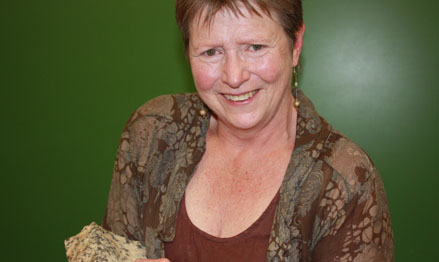Latest News Archive
Please select Category, Year, and then Month to display items
03 January 2020
|
Story Xolisa Mnukwa
|
Photo Supplied
 The UFS Bloemfontein Campus, South Campus, and Qwaqwa Campus choirs are student-centred choirs functioning under the Student Affairs’ Arts, Culture and Dialogue office.
The UFS Bloemfontein Campus, South Campus, and Qwaqwa Campus choirs are student-centred choirs functioning under the Student Affairs’ Arts, Culture and Dialogue office.
It has been a noteworthy year for the University of the Free State (UFS) Choir, establishing itself on the student/university choir scene. The choir, based on the Bloemfontein Campus, represented the UFS at the bi-annual KUESTA choir festival earlier this year, showcasing its musical talent. The choir shared a stage with other university choirs from around the country.
The UFS (Bloemfontein Campus) Choir is a 42-member ensemble of students; the other two choirs, based on the South and Qwaqwa campuses, consist of 40 and 62 members respectively. The choirs are administered and managed by the Division of Student Affairs’ Arts, Culture and Dialogue Office. In addition to Kovsie culture, the choirs strive to have a varied repertoire of inclusive music, with the UFS BFN Campus choir performing a diversity of songs in English, Afrikaans, isiXhosa, and Sesotho.
The new South Campus choir was established in 2018 and is led by choir director, Bonisile Gcisa, who specialises in choral music. This leg of the choir will therefore perform many of his works, but will also include some of the Bloemfontein choir’s set lists, since most of the choir members will be auditioning in 2021 for the Bfn choir when they change campuses.
The Qwaqwa Campus choir will lean more towards a choral genre under the direction of Sipho Khumalo.
The UFS Bloemfontein Campus choir was officially re-established under the leadership of choir conductor Leona Geldenhuys in March 2018, and has performed at several events, including the Rector’s Concert, the annual KUESTA choir convention, and the Bloemfontein Choir invitational. The group has also held a number of public performances on the Thakaneng Bridge at the UFS Bloemfontein Campus.
“Part of the UFS Student Affairs’ objective is to create an inclusive and a socially just student lived experience, and that is the mandate the choirs will also adopt. We hope to create an experience that not only enhances our students’ singing abilities, but also contribute to a more inclusive university experience.” – Angelo Mockie – Director: UFS Student Affairs Arts, Culture and Dialogue office.
“Rest well, be safe, and return rejuvenated,” were his parting words to students for the festive season.
Prof Tredoux turns theories regarding the formation of metals on its head
2013-09-17
|
 |
|
Prof Marian Tredoux
17 September 2013 |
The latest research conducted by Prof Marian Tredoux of the Department of Geology, in collaboration with her research assistant Bianca Kennedy and their colleagues in Germany, placed established theories regarding how minerals of the platinum-group of elements are formed, under close scrutiny.
The article on this research of which Prof Tredoux is a co-author – ‘Noble metal nanoclusters and nanoparticles precede mineral formation in magmatic sulphide melts’ – was published in Nature Communications on 6 September 2013. It is an online journal for research of the highest quality in the fields of biological, physical and chemical sciences.
This study found that atoms of platinum and arsenic create nanoclusters, long before the mineral sperrylite can crystallise. Thus, the platinum does not occur as a primary sulphur compound. The research was conducted at the Steinmann Institute of the University of Bonn, Germany, as well as here in Bloemfontein.
Monetary support from Inkaba yeAfrica – a German-South African multidisciplinary and intercultural Earth Science collaborative of the National Research Foundation (NRF) – made this research possible. Studies are now also being conducted on other metals in the precious metal group, specifically palladium, rhodium and ruthenium.
The discovery of the nanoclusters and the combination with arsenic can have far-reaching consequences for the platinum mine industry, if it can be utilised to recover a greater amount of platinum ore and therefore less wastage ending up in mine dumps. This will signify optimal mining of a scarce and valuable metal, one of South Africa’s most important export products.
For Prof Tredoux, the research results also prove thoughts she already had some twenty years ago around the forming of platinum minerals. “Researchers laughed in my face, but the evidence had to wait for the development of technology to prove it.” Young researchers were very excited at recent congresses about the findings, since the new models can bring new insights.
“Chemistry researchers have been talking about platinum element clusters in watery environments for quite a while, but it was thought that these would not appear in magmas (molten rock) due to the high temperatures (>1 000 degrees celsius).”
Prof Tredoux has already delivered lectures at congresses in Scotland, Hungary, Sweden and Italy on this research.
Read the article at: http://www.nature.com/ncomms/2013/130906/ncomms3405/full/ncomms3405.html